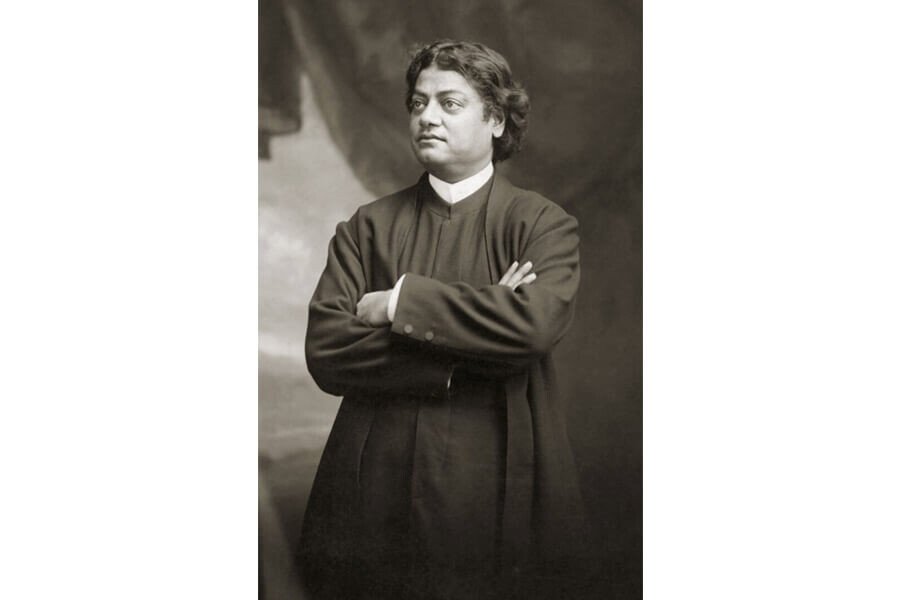The immutable calm of the Sannyasi irritated the fellow passenger, a petty trader. He looked upon the hordes of Sadhus as parasites and saw an opportunity to give a piece of his mind to this young man in ochre who, he decided, ought to earn an honest living instead of hoodwinking people.
This incident in the life of Swami Vivekananda had taken place in the summer of 1890 when he was a young unknown sannyasi and not a world celebrity after the Parliament of Religions at Chicago (September 1893). Swamiji had been on a visit to the ruler of a Princely State and was now traveling in a third class compartment. He had refused to take anything from the ruler who would have been glad to offer much wealth to Swamiji, but the latter was adamant. Only a ticket — that too by the third class — was all that he needed.
In those days in the hot summer months, because of a great shortage of water in Rajasthan, drinking water sold for one paisa a glass on wayside stations. Swami Vivekananda, not having a single paisa with him, could not buy water. The trader had noted this. He asked Swamiji how it was that he didn't have even a few coins with him, to buy water, or food! Swamiji replied that God carried his purse and always looked after his needs; he didn't burden himself with money or other possessions. This was a good point to nettle the Sannyasi, thought the trader. He had with him a surai — an earthen pot filled with water — and a basketful of food. From time to time he drank some cool water and took a sweet or a fruit. And all the time he kept taunting Swamiji with the negligence of his God, who didn't care how much his disciple suffered!
Swamiji refused to get annoyed or to retort. He remained calm. This infuriated the passenger even more. At about lunch-time they reached a small junction station of Uttar Pradesh where they had to change trains. The other train was to come after an hour or so. In those days some of the out-of-the way small stations didn't even have a shed for the passengers to relax under.
This station had a single tree to provide shade to the third class passengers. The trader at once took out a duree, a thick cotton spread and unrolled it under the most shady part of the tree and brought out food from his basket, cool water from his earthen pot and partook of a hearty meal, all the while taunting Swamiji and his God about the inability of the latter to provide even a drop of water to his hungry and thirsty disciple. Swamiji kept smiling as he sat on the ground.
Suddenly they saw a man hurrying towards them. He had a clean mat and a covered basket in one hand and a large tumbler in another. He spread the mat at a clean place, took out a leaf and arranged on it cooked vegetables, pooris, two or three types of sweets and then came with the tumbler towards Swami Vivekananda and with folded hands said, “Come, Swamiji, be pleased to take some food.”
The trader was watching this with intense curiosity. Swamiji answered the stranger, “Brother, surely you are mistaken. You do not even know me. I am here for the first time. How could you have brought food for me? It must be meant for someone else.”
The man answered humbly "I am a food vendor. In the morning I prepared some vegetables and pooris and some sweets and sold them. At noon, having finished my business, as usual I lay down to sleep. While I was asleep I saw Ram-ji standing by my side. With the touch of his foot he woke me up. I thought it was a dream, so I changed sides and went back to sleep. This time Ram-ji prodded me with his foot and told me, ‘Wake up, one of my devotees, a Sannyasi, is sitting on the station platform. He is thirsty and hungry. Carry food and water for him.' I woke up and prepared these fresh pooris and came running. Here is some cool water. Please wash your hands and feet. Due to you I had the darshan and touch of Ram-ji.” The man prostrated himself before Swamiji.
Tears of love flowed from Swamiji's eyes as the trader fell at his feet and begged forgiveness.
A True Story Retold by Shyam Kumari
(Courtesy: The Heritage, August 1987)











